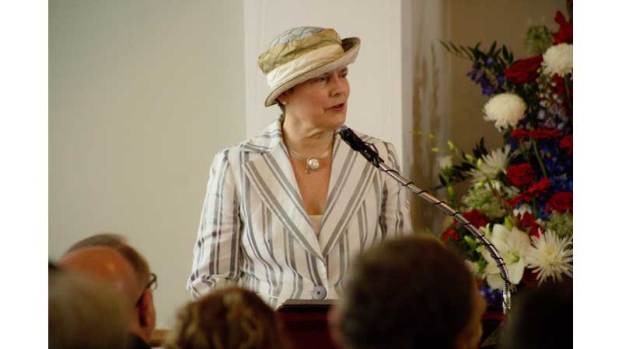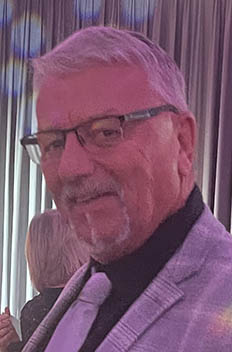Community remembers Wilson
Published 10:30 am Tuesday, June 27, 2017
Packing College Presbyterian Church on Friday, family, friends, colleagues and those inspired by the late Lt. Gen. Samuel V. Wilson remembered his lasting impact and legacy on the community, Hampden-Sydney College (H-SC), the United States and the world.
Wilson, 93, who served as director of the Defense Intelligence Agency (DIA) and president of Hampden-Sydney College (H-SC), died June 10 at his home in Rice.
Wilson completed his active military career in the fall of 1977, served as director of the DIA from May 1976-August 1977 and was known for his work in doctrine for low intensity conflict, where he coined the term counterinsurgency, or COIN. Wilson is credited for helping establish the Delta Force, the Army’s top counterterrorism unit.
“Sam’s focus on others in the world is why so many of you are gathered here today to acknowledge his work lives on in us,” said H-SC President Dr. Larry Stimpert during the memorial service.
The Rev. M. Keith Leach ‘81, pastor of College Presbyterian Church and chaplain of Hampden-Sydney College, presided over the service alongside the Rev. Dr. William E. Thompson, the retired pastor of the church and former H-SC chaplain. Sandy Yeatts sang the national anthem.
According to a press release from H-SC, scripture readings were offered by M. Peebles Harrison ’89, chairman of the college’s board of trustees, John M. “Jack” Boswell ’65, a member of the board of advisors for the Wilson Center for Leadership in the Public Interest, and John Z. Axsom ’05.
According to H-SC Dean of Admissions Anita Garland, who spoke during the service, Wilson became president at the college during an “unsettled” time.
“They found him at his farm in a field behind a plow,” Garland said regarding when Wilson was asked to serve as college president. “The chairman of our board said one sentence: ‘Sam, we need you as president of our college.’”
Wilson didn’t hesitate to take the position, Garland said.
When he became president in 1992, Garland said he made the most important person on campus the student.
“Finally stability came to H-SC. He became our rock, and defined his presidency,” Garland said, calling him a servant leader.
According to the press release, eulogies were delivered by Ret. Lt. Gen. William G. Boykin, Garland, Vice President for Institutional Advancement Dr. Herbert L. “Lee” King ’94, and Ret. Lt. Col. Samuel Wilson Jr., the elder Wilson’s son.
“Warrior, diplomat, professor, mentor, musician, actor, college president, Sunday school teacher, advisor, counselor, father, husband, friend and, most of all, true patriot,” Boykin said, describing Wilson. “The story of Sam Wilson is so incredible that many who didn’t know him will honestly wonder if this is someone who was created in Hollywood or by a novelist.”
Often referred to as “General Sam,” Wilson’s counsel was frequently sought by national leaders, including Presidents Richard Nixon, Jimmy Carter, Gerald Ford and George H.W. Bush, according to his biography. “His expertise was instrumental in the stand-up of a dedicated counter-terrorism unit and the legitimizing of special operations forces under a unified joint command.”
Wilson was president of H-SC from 1992 to 2000.
According to his biography, Wilson was born Sept. 23, 1923 in Rice. His father worked as a farmer near the Sayler’s Creek Civil War battlefield, and his mother taught school. After graduating at age 16 from Rice High School, Wilson lied about his age to join the Virginia National Guard as a bugler.
“Successfully rising in the enlisted ranks to acting first sergeant, he was sent to Infantry Officer Candidate School (OCS) where he graduated at the head of his class and was assigned as an instructor at the Infantry School, teaching among other subjects guerrilla and counter-guerrilla tactics,” Wilson’s biography states.
“This man, who earned his letters on the campus of the world, has stepped into the passing ranks of the greatest generation,” said Lt. Col. Wilson of his father, according to the press release. “Yet I suspect that in the quiet, hopeful, morning hours on these grounds, as you walk to Settle Hall for breakfast or to early class or to work, he -— with a respectful nod to the fallen Spartans at Thermopylae, that economy of force that saved the idea of democracy for the future millennium — in his soft southern brogue, just might call out to you: ‘Go tell my country, men of Hampden-Sydney and citizens passing by, that here, ever faithful to her sacred values, my spirit lies.’”
Chaplain Col. Keith N. Croom of U.S. Army Special Operations Command (USASOC) read the Special Forces Prayer, after which the “Ballad of the Green Beret” was played, according to the press release.
“Susi Wilson, Gen. Wilson’s widow, was then presented an American flag by Lt. Gen. Kenneth E. Tovo, the commanding general of USASOC. An honor guard comprised of soldiers from USASOC performed a 21-gun salute and the sounding of ‘Taps’ was performed by Staff Sgt. Brian Hall of the 392nd Army Band at Fort Lee. Hampden-Sydney professors Dr. Kevin Dunn and Dr. Marc Hight performed ‘Amazing Grace’ on bagpipes.”
Referencing the motto of special forces, Boykin concluded his remarks by saying, “Old soldier, you’re free now, as you sit at the right hand of God. God Bless you.”
In a previous interview, Ret. Lt. Col. Rucker Snead, the director of Wilson Center for Leadership in the Public Interest at Hampden-Sydney College, put a spotlight on a part of Wilson’s service that particularly illustrated the man’s toughness, mentioning Wilson’s time in World War II as chief reconnaissance officer with the 5307th Composite Unit (Provisional), also known as “Merrill’s Marauders.”
“A good part of that unit was killed or wounded or was evacuated because of (illnesses) — malaria, yellow fever, typhus — and I think he had just about all those diseases, and he survived,” Snead said.
After retiring from the military, Wilson came home to Rice. Snead noted that the uniform came off, but Wilson’s role of being a servant-leader endured.
“He truly believed in being a servant-leader, serving his local community, Prince Edward County, Southside Virginia, Hampden-Sydney College,” Snead said. “Yes, he was in leadership positions, but he was there to serve others, and that’s really much who he was and how he’d like to be remembered.”
Snead noted that as Wilson got involved in the community, he never held an elected position, “but he had the moral voice. So he was one of the key leaders, ultimately, with the development of the (Robert Russa) Moton Museum and the efforts for racial reconciliation. He served on the board of the Moton Museum for a long time,” and he was its president from 2000 to 2002.







